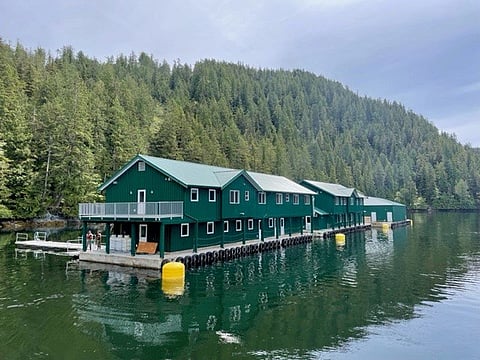

The Kitasoo Xai'xais Nation has responded to Alexandra Morton Gwayum'dzi, a well-known anti-salmon farming activist in British Columbia, after she posted a video on her social media in relation to a Community Science Workshop on finfish aquaculture conducted by the BC First Nation. "The clip that was doctored and shared by Ms. Morton grossly undermines the workshop's goal, and we feel it was a disrespectful representation of the hard work and dedication of these world-renowned scientists and the Kitasoo Xai'xais Nation", they said.
The statement made through the Facebook page of Kitasoo Development Corporation (KDC), a holding company owned by the Kitasoo Xai'xais Nation, claims that in her video Alexandra Morton purposely selected only portions of the data and content from the original presentation, resulting in a misleading message to the general public. "All of this sea lice data has been independently collected by Kitasoo Xai'xais fisheries staff over the course of 18 years, longer than any other. The information presented in the workshop is critical to the success of our Nation and the industry, and it is disheartening to see it misrepresented in such a manner", they explained.
The original video, in which Dr. Simon Jones talks about 'Impacts of Parasites on Wild Salmon Populations', is just over 30 minutes long. In posting her version of the clip, the activist acknowledges that she edited it – "I edited this from 30 minutes down to 1.5 minutes", she writes -, and after KDC's Facebook post, she continues to defend it. "I believe your members were not give the full significance of the data that Dr. Jones shared with you", she says in a response to the post. The activist further discusses the "relationship" between lice on salmon farms and lice on wild salmon.
Meanwhile, the message from Kitasoo Development Corporation reminds us that, as Indigenous people, they have a rich history and a deep connection to their traditional territories and their resources. "Our community has been putting in tremendous effort to create a sustainable plan for the future, and it is imperative that the information shared about these efforts is accurate and respectful. The workshop was essential in educating others and supporting our community, and it is unacceptable to see it reduced to a condescending and inaccurate representation", they claimed.
The Kitasoo Xai'xais Nation, owns 6 of the 79 salmon farming licenses whose future depends on the Canadian government's decision on net pen salmon farms. These licenses are currently operated by Mowi Canada West. However, the Tribe is aware that some members of their community may not be fully supportive of salmon farms and therefore believe that dialogue is essential to create a transition plan that reflects the views of their community as a whole.
"The workshop gave them a valuable opportunity to engage with scientific information and ask challenging questions to renowned scientists", they say. "We stand firm in our belief that all Indigenous Rights and Title must be respected", they continued. "We ask that Ms. Morton retract her inaccurate representation of the workshop and provide a corrected statement that accurately reflects the information shared". Kitasoo Development Corporation's statement ends with these words: "Our community and the people deserve the truth, and it is our hope that this matter can be resolved respectfully and productively".
All this controversy comes just days after the Canadian Scientific Advisory Secretariat (CSAS) posted on the Fisheries and Oceans Canada (DFO) website a peer-reviewed Scientific Response Report concluding that sea lice on farmed salmon do not affect sea lice levels in juvenile wild salmon in British Columbia. This new report added to the nine previous CSAS scientific reviews of salmon aquaculture in BC. All of them concluded that there is "minimal risk" to Fraser River sockeye salmon from all relevant fish pathogens.
